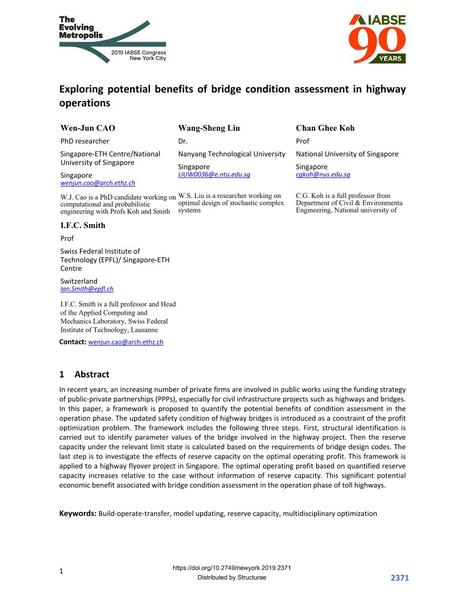Exploring potential benefits of bridge condition assessment in highway operations

|
|
|||||||||||
Bibliografische Angaben
| Autor(en): |
Wen-Jun Cao
(Singapore-ETH Centre; National University of Singapore)
Wang-Sheng Liu (Nanyang Technological University) Chan Ghee Koh (National University of Singapore) I. F. C. Smith (Swiss Federal Institute of Technology (EPFL); Singapore-ETH Centre) |
||||
|---|---|---|---|---|---|
| Medium: | Tagungsbeitrag | ||||
| Sprache(n): | Englisch | ||||
| Tagung: | IABSE Congress: The Evolving Metropolis, New York, NY, USA, 4-6 September 2019 | ||||
| Veröffentlicht in: | The Evolving Metropolis | ||||
|
|||||
| Seite(n): | 2371-2376 | ||||
| Anzahl der Seiten (im PDF): | 6 | ||||
| DOI: | 10.2749/newyork.2019.2371 | ||||
| Abstrakt: |
In recent years, an increasing number of private firms are involved in public works using the funding strategy of public-private partnerships (PPPs), especially for civil infrastructure projects such as highways and bridges. In this paper, a framework is proposed to quantify the potential benefits of condition assessment in the operation phase. The updated safety condition of highway bridges is introduced as a constraint of the profit optimization problem. The framework includes the following three steps. First, structural identification is carried out to identify parameter values of the bridge involved in the highway project. Then the reserve capacity under the relevant limit state is calculated based on the requirements of bridge design codes. The last step is to investigate the effects of reserve capacity on the optimal operating profit. This framework is applied to a highway flyover project in Singapore. The optimal operating profit based on quantified reserve capacity increases relative to the case without information of reserve capacity. This significant potential economic benefit associated with bridge condition assessment in the operation phase of toll highways. |
||||
